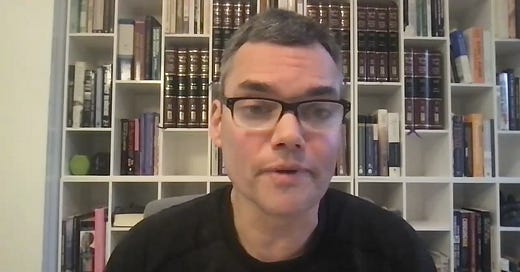Our Zoom call this week will be at a special time: Thursday at 1 PM EST. There will be no zoom call on the week of Friday, December 22 or 29.
Our guest will be Trita Parsi, executive vice president of the Quincy Institute and the author of three highly acclaimed books on the relationship between the United States, Iran, and Israel. We’ll talk about the response by Iran and its allies to October 7 and the risks that Israel’s Gaza war could convulse the entire Middle East.
As usual, paid subscribers will get the link this Tuesday and the video the following week. They’ll also gain access to our library of past Zoom interviews with guests like Thomas Friedman, Ilhan Omar, Omar Barghouti, Benny Morris, Noam Chomsky, and Bret Stephens.
Sources Cited in this Video
CSPAN video of the Congressional hearings on campus antisemitism.
Uprisings against Arab governments are called intifadas too.
Elise Stefanik’s flirtation with Great Replacement Theory.
Marwan Barghouti on the motivations for the second intifada.
How pro-Israel pundits and organizations use allegations of antisemitism to avoid talking about what Israel does to Palestinians.
Things to Read
(Maybe this should be obvious, but I link to articles and videos I find provocative and significant, not necessarily ones I entirely agree with.)
In Jewish Currents (subscribe!) Mari Cohen examines the way liberal Zionist groups have responded to Israel’s war in Gaza.
John Judis on the value and limits of calling Israel a “settler-colonial” state.
Mouin Rabbani on Israel’s role in boosting Hamas.
Robert Pape and Tony Karon and Daniel Levy on why Israel is losing the war.
Most American scholars of Middle East studies censor themselves when talking about Israel-Palestine.
Last week, I spoke at a Chanukah-themed ceasefire rally in New York.
I also talked to Joy Reid on MSNBC about why Israel’s war won’t make Israelis safe.
See you on Thursday at 1 PM,
Peter
VIDEO TRANSCRIPT:
I want to say something about the series of events that have now led to the resignation of the president of University of Pennsylvania and could perhaps lead to the resignation of other university presidents for allegedly not opposing calls for genocide of Jews on college campuses. And the key thing to understand about what’s happened here is this. This I think is the key context. If you look at the way establishment American Jewish organizations operate, going back a whole bunch of years, they continually make this particular move. They try to turn conversations away from what’s happening on the ground to Palestinians to questions about the alleged motivations and actions of Israel’s critics in the United States or in other places. This is the reason I think in recent years there’s been this entire kind of obsessive focus on equating anti-Zionism with antisemitism because it’s a way of focusing attention on the motivations of critics of Israel in a condition which has become harder and harder for people to defend what’s happening on the ground.
So, you’ve had over the past few years—as you’ve had Israeli governments really going back to Benjamin Netanyahu taking power in 2009 that have been essentially explicitly opposed to a Palestinian state and working hard to make one impossible—it’s become harder for people whose job it is to defend Israel to actually claim as they used to that Israel really wants to create a Palestinian state, but the Palestinians won’t take one. It’s been harder to deal with the fact that now you have human rights organizations calling Israel’s behavior apartheid. So, what do you do? You turn the conversation towards the alleged antisemitism of people who were calling for one equal state, i.e., anti-Zionists. And the more difficult it becomes to defend Israel’s actions on the ground, the harder one needs to work to again create a new conversation about what’s happening among Israel’s critics. And, certainly since October 7th, after the horrifying massacre of Israelis, what’s been happening in Gaza has been pretty terrible to Palestinians.
And so, from the point of view of establishment American Jewish organizations, any conversation about what’s happening in Gaza, essentially, or even the West Bank for that matter, you’re already losing if you’re engaged in that conversation. Much better to have a completely different conversation, not about what’s happening to Palestinians there, but about the actions of Israel’s critics here. Now, I don’t want to suggest this is like just some big conspiracy theory. I don’t think it’s that. I think there are organizations that have this mission. But I also just think frankly it’s a natural desire by a lot of people who support Israel to not focus on something which is really, really difficult and unpleasant, which is what’s happening in Gaza, and doesn’t allow Jews to be in the role of the victims, right? Whereas turning the conversation to discussions of antisemitism in the United States is a much more familiar position for American Jews to be in given that establishment-minded American Jews simply don’t accept the basic premise that Israel, or a Jewish state, could ever really be fundamentally oppressive. So, when you turn the conversation away from Gaza, you’re turning it from a conversation which is extremely uncomfortable for you because it requires you to really engage with these terrible things that Israel is doing to a conversation, which is a more comfortable conversation, because it’s about Jews in the role of victims, which is basically the role that have established American Jewish organizations have always been casting Jews, right?
Now, this is not to say that there is not antisemitism going on in the United States. They clearly is, right? As I said a few weeks ago, we know that antisemitism tends to go up when there’s more violence in Israel-Palestine. But the descriptions of the kind of antisemitism that is supposedly happening on college campuses, right, is completely divorced from actual reality. And this is kind of what you see in this congressional testimony. So, what happens in these congressional hearings is the Republicans keep on alleging that these universities are infested with massive amounts of antisemitism, and not just antisemitism, but genocidal antisemitism, right? There’s no discussion in the hearings whatsoever of any context about what’s happening in Gaza that might help to explain why anyone on a college campus might be upset at Israel right now. Literally, you could watch that entire hearing and you probably would not know that any Palestinians in Gaza had died. You certainly would not know that Israel is considered an apartheid state by its own leading human rights organizations. All you would know is that basically a bunch of rabid Jew haters woke up one morning on these college campuses and decided they were desperate to kill Jews, right?
And the Democrats don’t challenge this assumption really at all either. The Democrats are basically completely useless, right? They throw out a few references to Trump’s antisemitism, or a couple of stray references to Islamophobia, or the fact that Republicans want to defund the civil rights wing of the Justice Department, but they never actually say anything about what’s happening to Palestinians that might create any context for what’s happening. So, in this completely decontextualized conversation, the Republicans refer to certain kinds of phrases, right? In particular, in this hearing, they refer a lot to the phrase, ‘intifada,’ right? Which they define as a call for the for genocide against Jews, right? Now, this is not, I think, a good faith description of what intifada means, right? Intifada basically is an Arabic word, basically means ‘uprise,’ right? It doesn’t mean uprising against Jews. There have been intifadas against Arab governments. The bread intifada in Egypt many, many years ago, right?
There were two Palestinian intifadas against Israel. The first one starting in 1987, the second one starting in late 2000. The first one involved stone throwing and Molotov cocktails, and also a lot of non-violence like boycotts, refusal to pay Israeli taxes. The second one was more violent, including really horrifying suicide bombings, for instance. The first came after 20 years of Israeli oppression, right? Again, the notion from the hearing you would think is that basically Palestinians just woke up one morning with this lust to just kill Jews and any Jews they could find, right? The First Intifada breaks out after 20 years of Israel’s occupation of the West Bank and Gaza. The Second Intifada breaks out after Israel responds very brutally to Palestinians stone throwing after Ariel Sharon’s visit to the Temple Mount. Israelis feel that it’s after a period where they’ve tried to create a Palestinian state, but Palestinians feel it’s based in the context in which Israel has basically just continued to build settlement growth and move Palestinians further and further away from a state.
And in order to understand kind of what Palestinians were saying during the Second Intifada, which was the more murderous one, right, the more violent one. Here’s Marwan Barghouti writing in at the time in 2002, probably the most famous kind of architect or person involved in that Second Intifada. He goes to jail for it. Marwan Barghouti writes, ‘the only way for Israelis to have security is quite simply to end the 35-year-old Israeli occupation of Palestinian territory. Israelis must abandon the myth that it is possible to have peace and occupation at the same time, that peaceful coexistence is possible between slave and master. The lack of Israeli security is born of the lack of Palestinian freedom,’ right? These are not calls for Jewish genocide, right? This is a violent uprising against Israeli oppression; I happen to think a counterproductive one, and one that involved some really, really immoral actions like these suicide bombings. But they’re not a call for the genocide of all Jews, right?
But this is the pretext that is laid out by the Republicans, and these Democrats don’t challenge it, and the university presidents don’t challenge it. The university presidents are so desperate basically just not to say anything their lawyers think will get them in trouble that they basically give these robotic, evasive kind of platitudinous answers again and again and again, right. So, then you get to, Elise Stefanik, right? She’s this Member of Congress from New York state. She’s supposedly a great defender of the Jews even though she’s a big Trump supporter and she’s endorsed the Great Replacement Theory. But whatever. We’re supposed to believe she’s a huge defender of the Jews, right? So, basically, she says, will you say, university presidents, that it is not acceptable to call for the genocide of Jews on your campus. Well, like, no one has actually presented any evidence that there have been calls for the genocide of Jews on these campuses, right? And so, the president of MIT, to her credit says, ‘I haven’t heard anyone calling for the genocide of Jews.’ And Stefanic says, ‘no, but you’ve heard the chants of intifada, right?’
And because these university presidents are too afraid to get into any substantive discussion of what intifada means and the context of Israel-Palestine, they basically accept this premise, this ridiculous premise, that intifada means a call for the genocide of all Jews, right? And then they’re screwed, right? Because basically like now, once they’ve accepted this premise, unless they basically say that calling for the intifada, that would be an offense that you have to suspend someone for or fire them or expel them for, right, which they don’t want to do because they know that’s a blatant violation of free speech, they can’t give a forthright answer which says, ‘yes, it’s not acceptable to call for the genocide of Jews.’ Whereas the honest thing to say would be, ‘of course, it’s not acceptable to call for the genocide of Jews, but these pro-Palestinian protesters are not saying that.’ Now, it doesn’t mean that one has to love all their all their slogans. I don’t love the slogan ‘intifada revolution’ or ‘globalize the intifada,’ which means some kind of globalized uprising against Israeli and presumably American oppression too because America is deeply behind this, right? And again, I don’t even love the phrase ‘Palestine from the river to the sea.’ I could think of various different phrases I would prefer. But none of these phrases are on their face anything like calls for Jewish genocide. And you can look at what Rashida Tlaib or Marc Lamont Hill have said about what they mean by the phrase ‘Palestine from the river to the sea.’ What they mean by it is equality between Palestinians and Jews. They’re very explicit about it, right?
But the presidents accept this this pretext and then basically, politically, they’re completely screwed. And so, what makes this even more surreal, right, is that what’s happening in Gaza, right, even if you don’t go as far as calling it a genocide, right, it has involved the displacement of 85% of the people of Gaza from their homes, more people in Gaza, more women and children killed in two months than were killed in 20 years in the US war in Afghanistan. So, in that context, right, if you’re worried about genocide or things that could potentially be genocide, right, to think that what you should be worried about is the chant of intifada on a college campus, right, when you have this magnitude of slaughter, I mean, it’s completely surreal. But the surreality is the point. This is exactly the point. It is to basically turn people’s attention away from what’s happening in Gaza and create an entirely different conversation based on the alleged motivations of critics in the United States. This is not to say that antisemitism isn’t a genuine concern in the United States. It is a genuine concern. It always has been. And there’s more antisemitism probably since October 7th again because tragically there always tends to be when there’s more violence, right? But to suggest that that’s the story of genocide, right, given what’s happening in Gaza, it’s completely Orwellian, right?
And even more kind of absurd, right, and kind of Orwellian is the fact that these Members of Congress, these Republicans, were basically out of one side of their mouth, they’re saying, ‘are you going to expel these students? Are you going to suspend them? Are you going to fire them? Who have you fired? Who have you expelled?’ In the next breath they say, ‘we don’t think you truly believe in free speech and academic freedom. We don’t believe you really oppose cancel culture because you haven’t given enough free speech to conservatives,’ right? I mean, on the one hand, they’re saying, ‘you don’t support free speech enough.’ On the other hand, they’re saying basically, ‘we demand that you ban and suspended fire and expel these pro-Palestinian students.’ Now, I actually do think there have been serious offenses against conservative free speech on college campuses. I’ve actually written about this. I wrote about why universities needed to allow people like Charles Murray and Milo Yiannopoulos, people whose views I very much dislike, to speak on college campuses. But you can’t have it both ways, right? You can’t say the problem with universities is they don’t really believe in free speech, and then demand that they crack down on free speech.
Some people who fancy themselves a little more sophisticated, right, have said—conservatives, I’m talking about kind of pro-Israel conservatives—said ‘no, we really do believe in free speech but we are against the double standards. We believe there’s been a double standard in which people get punished for saying things about Black people or LGBT people, but they don’t get punished for saying the same things about Jews.’ I also think that’s nonsense. It’s just not actually true, right? If it were the case that there were people who were saying ‘kill all the Jews,’ and they were getting away with it, then maybe you would have a case. But there’s actually been no evidence presented that that’s actually what’s happening, right? And in fact, you know, as far as I know, Penn, you know, Columbia, Brandeis, George Washington University have not banned their young Republicans clubs, right, even though those Republican clubs now represent a party led by Donald Trump that has called for banning all Muslims in the United States, basically have a kind of fundamentally racist agenda when it comes to the right of Black people to vote, right? Those Republican clubs are still there, right? And yet it’s the Students for Justice in Palestine clubs at these schools that have been suspended or banned, right? So, I don’t actually see a double standard in which people can say things about Jews that they can’t say about Black people or LGBT people.
It seems to me actually what’s happening since October 7th is a significant ratcheting up of the suppression of free speech beyond anything we saw beyond that, and especially because it’s now being pushed by politicians. It’s being pushed by the federal government and state governments. Ron DeSantis has demanded that Students for Justice in Palestine be banned on Florida campuses. We’re seeing all kinds of bills in state legislatures and Congress to basically federally mandate these, you know, the limitations on pro-Palestinian speech. And that is the agenda here, right? And we are in a moment that will go down as a kind of historic assault on freedom of speech. And one of the things that we’re seeing in this moment that’s becoming clear is this institutional infrastructure that is designed to give Israel impunity for whatever it wants to do, the worse what Israel does becomes the more that infrastructure needs to mobilize against the free speech rights of Americans because there are a lot of progressive Americans who are looking at what’s happening in Gaza, doing exactly the thing that the American Jewish establishment doesn’t want them to do. They’re looking at what’s happening, and they want to mobilize against it. And the more they mobilize against it—because of how things bad things are there—the more you have to make an effort to silence them. And therefore, this kind of infrastructure designed to give Israel impunity ends up being a really serious threat to freedom of speech on college campuses. And not just college campuses, as we’ve seen, for instance, the effort to criminalize people who support Boycott Divestment Sanction. So, the struggle, it seems to me to end Israeli impunity also is a struggle for academic freedom and free speech in the United States.
Our call this week for paid subscribers will be at Thursday at 1pm, not our normal Friday, Thursday at 1pm. We’ll be joined by Trita Parsi, the executive vice president of the Quincy Institute. Trita has written three books—excellent books—about the relation between the United States, Israel, and Iran. And we’re going to talk about the kind of regional context of Israel’s Gaza war: how Iran has been behaving, what are the potential for some kind of regional war that could grow out of this. That’ll be Thursday at 1pm for paid subscribers.










